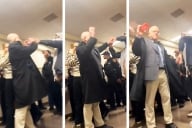You have /5 articles left.
Sign up for a free account or log in.
Education Secretary Betsy DeVos's appearance on 60 Minutes Sunday was widely panned, with special scrutiny for her one foray into higher education policy, in which DeVos said she didn't know which was greater -- the number of false accusations of sexual assault on campus or the number of campus rapes.
It’s an answer that the Education Department has walked back now in response to questions from Inside Higher Ed. A department spokeswoman, Liz Hill, said Tuesday that DeVos agrees that false reports are a fraction of the overall complaints.
"Of course she doesn’t believe that and she didn’t say that," Hill said. "What she said is one sexual assault is one too many and one falsely accused student is one too many.” (Note: This article has been updated to include this quotation and the following paragraph.)
In the 60 Minutes interview, DeVos said "I don't know" when asked if the number of false accusations is equivalent to the number of sexual assaults.
A reporter asked if DeVos does not believe that that false reports are rare compared to actual rapes or assaults. Hill said DeVos "doesn't believe that," which was unclear in her 60 Minutes segment. Asked to clarify whether DeVos "agrees or disagrees" with the statement that false reports are a small percentage of complaints, Hill said, "Agree."
Research shows that untrue allegations are indeed a small percentage of reported college sexual assaults.
One of the most widely cited studies, published in 2010, comes from David Lisak, a clinical psychologist who found that about 6 percent of sexual assault reports made to a campus police department were false. Lisak’s deep analysis of past research also showed that the rate of false reporting fell between 2 and 10 percent.
He and his colleagues examined a decade’s worth of reports, 136 of them, to an unnamed university police force and deemed only eight of them to be untrue. The researchers only considered a report false if police had looked into the case and found evidence that a sexual assault had definitively not occurred.
Cases that lacked enough information to investigate were not considered false.
Critics have identified flaws in this and other studies, challenging whether reports to law enforcement or to a college or university can be equated. It is generally agreed that many sexual assaults go unreported. An oft-cited -- and challenged -- statistic, which was backed up by a Justice Department study in 2016, is that one in five undergraduate women experience some form of sexual assault in college.
The Obama administration focused on major reforms designed to protect survivors of sexual assault, but President Trump’s Education Department has begun to roll these measures back, asserting they were unfairly skewed against students (predominantly men) accused of rape and colleges.
DeVos has hammered the importance of “due process” in sexual assault cases, joined by a chorus of those opposed to the Obama administration’s actions, who have said colleges are ill equipped to investigate and adjudicate such matters -- “kangaroo courts” is a term often used.
These criticisms led to DeVos striking down guidance on implementing the federal antidiscrimination law, Title IX of the Education Amendments of 1972, which was issued in 2011 in the form of a Dear Colleague letter and which survivor advocates credit with offering new protections for students.
In the 60 Minutes interview, correspondent Lesley Stahl asked DeVos, “Are you in any way, do you think, suggesting that the number of false accusations are as high as the number of actual rapes or assaults?”
DeVos dodged the question, saying, “Well, one sexual assault is one too many, and one falsely accused individual is one too many.”
But Stahl repeated, “Yeah, but are they the same?”
DeVos replied that she doesn’t know.
Carly Mee, interim executive director of the survivor advocacy group SurvJustice, said DeVos’s comments suggest that the administration severely underestimates the prevalence of sexual assault and that the department is not basing its work in fact.
“The biggest problem is the message that this sends to survivors -- that they aren't a priority to Betsy DeVos, but are instead of the same level of concern as perpetrators of sexual violence,” Mee said.
SurvJustice was one of several plaintiffs that sued DeVos in January over the rollback of the Obama edicts, the 2011 letter and follow-up guidance in 2014 on Title IX.
The Office for Civil Rights has since published interim guidelines before the department accepts public feedback on new rules. These allow much more flexibility for colleges, letting them deviate from the “preponderance of evidence” standard that the Obama administration required -- this is a lower standard of evidence than “clear and convincing.” DeVos also removed the suggested 60-day timeline for resolving sexual assault cases and allowed for mediation in certain cases.
-- Andrew Kreighbaum contributed to this report.








